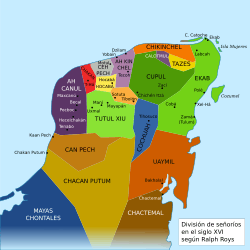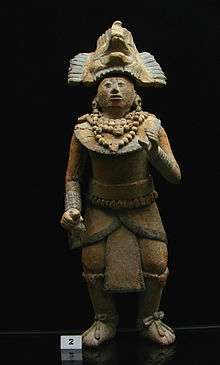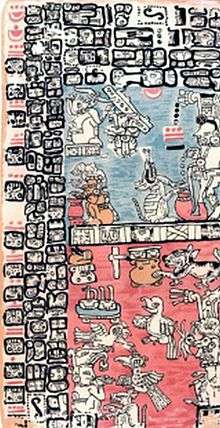Chakán Putum
| Kuchkabal Chakan Putum | ||||||||||
| ||||||||||
 Kuchkabals of Yucatan after 1461. | ||||||||||
| Capital | Chakan Putum | |||||||||
| Languages | Official language: Yucatec | |||||||||
| Religion | Maya religion | |||||||||
| Government | Monarchy | |||||||||
| Historical era | post classic period / Early Modern | |||||||||
| • | Established | 1441 | ||||||||
| • | Disestablished | 1529 | ||||||||
| ||||||||||
Chakán Putum was the name of a Mayan chiefdom of the southwestern Yucatán Peninsula, before the arrival of the Spanish conquistadors in the sixteenth century.[1] It was named after the capital city Chakan Putum. The city had approximately 8000 houses. It was a major port.
Organization
After the war between the Tutul Xiu and Cocom, the Yucatán Peninsula, broke up into approximately 16 kuchkabalob. In the present day state of Campeche there was Ah Canul, Can Pech and Chakán Putum. Conflicts between Kuchkabal were common, especially between Tutul Xiu and Cocom.
Normally each Kuchkabal had a capital where the ruler and supreme priest lived. The ruler was called a Halach Uinik. Each Kuckabal was divided into several municipalities called "Batalib" which in turn were governed by officials called "Batab" who were usually relatives of the Halach Uinik. Each Batab, was the military leader of its population.
On the religious side, after Halach Uinik, was the Ah Kin May, and the regular priests Ah Kin (meaning coming from the Sun). Also there was a sacrificial priest called "Ah Nacom".
European contact
In 1517, 18, and 19 the Spaniards battled the Maya of Chakan Putum. Chakan Putum had 2,000 war canoes. After the Spaniards allied with neighboring Can Pech and conquered Tabasco they invaded a fourth time between 1527 and 1528.


References
- ↑ Lagos, Felipe Daniel Ayala Y (July 2011). Kaan Yaan Teech (La Serpiente Eres T...). Palibrio. p. 110. ISBN 978-1-4633-0653-3. Retrieved 5 July 2012.